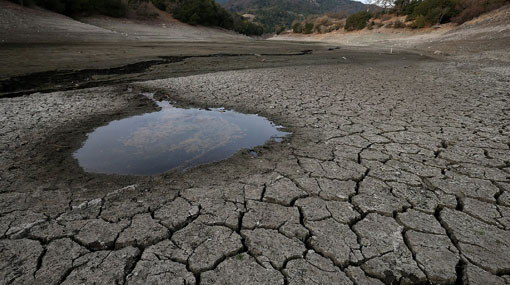Could restoring ancient water tanks help build peace in Sri Lanka?
February 8, 2017 11:03 am
After almost three decades of civil war, Sri Lanka has the daunting task of nurturing cohesion in its multi-faith and multi-ethnic community while also addressing the increasing impacts of climate change.
The small island country is already facing environmental challenges that could dwarf the damage inflicted by fractures in its society. Drought and erratic weather patterns deplete soils, leaving Sri Lanka increasingly vulnerable to climate change and new resource-driven conflicts. Its ancient and complex network of canals, connecting more than 15,000 small tanks and large reservoirs to feed a fertile and resilient ecosystem, is long gone. Sri Lanka now struggles for water.
But local researchers believe that restoring some of the small water tanks that peppered the island more than 2,000 years ago could ease all of these problems at once.
“Climate change is affecting the whole country, but there are communities who suffer more because of their inability to cope,” says Tharuka Dissanaike, policy specialist with the United Nations Development Programme (UNDP), which is rolling out a programme aimed at weaving climate resilience into Sri Lanka’s postwar recovery plans.
“Our assessment of the country’s vulnerabilities found that the districts where fighting had been going on for [almost] 30 years, in the northern and eastern province, are among those most prone to the impacts of erratic weather,” says Dissanaike.
The fieldwork has been eye opening. Dissanaike recalls meeting a young woman from a village almost everyone abandoned during the war. The few families left experienced severe hardships; bombs blasting all around and repeated threats from the military compelled the rest of the community to leave their homes.
“She told me that despite having struck through the war, the last five years have been the hardest for her family. Their home has been flooded twice and wild elephants, starved and thirsty during the dry spells, would regularly venture out of the jungle and attack people.”
Researchers found that while drought and high rain variability are reducing yields of crops such as maize, millet or chickpea, frequent floods are also damaging what little of the irrigation infrastructure remains intact after the war. The increasing threat of chronic kidney disease, the causes of which remain uncertain but have been linked to polluted water, also adds to the burden.
With a $38.1m (£30m) grant from the Green Climate Fund, the government is rehabilitating 320 of these small tanks, while UNDP is supporting the restoration of an additional 34, improving their design to match the needs of a growing population living under the strain of tougher weather.
The capacity of the tanks have been increased by putting to use so-called “dead storage” – the amount of water that, in a cascade system, cannot leave the tank without being pumped out.
“This groundwater table cannot be used for irrigation but serves other purposes, such as replenishing domestic wells with clean water and protecting people from the potential impacts of kidney diseases,” says Sampath Abeyrathne, UNDP’s technical coordinator for climate change adaptation.
Taking advantage of the natural inclination of the landscape, the cascading system connects small tanks with large reservoirs, preventing upstream waters from being dispersed quickly after it rains.
Maximising water collection and storage is a resilience strategy that works, says Abeyrathne. ”There are various dynamics with respect to resource sharing,” he says. “Farmers want to use more water for irrigation, while fishermen demand that the tanks remain full in order to sustain their fish stock.”
Scarce resources can often lead to conflict and the risk is thought to be even greater in Sri Lanka. An analysis by the UN’s Environment Programme found that the “impacts of climate change can trigger pre-existing ethnic, nationalist, religious divisions” and that conflicts between communities can arise “when [they] cannot or must fight harder to meet their basic needs”.
Sustainable access to water for the targeted communities from different ethnic and social groups in the north-central, north, east and north-western areas of Sri Lanka addresses a crucial push factor of conflict.
In the past, “the tanks were managed by local communities in a participatory manner. But the government took over their maintenance in the mid-1850s and failed to manage them properly,” says Herath Manthrithilake, head of the research programme at the International Water Management Institute in Sri Lanka. “The system gradually deteriorated and rural communities are now very much dependent on the few tanks still in operation.”
The importance of cooperation in the management of shared waters is a key goal of the restoration project. But when a large number of ethnic and faith groups share the same space, there are challenges.
“The strongest identity people have is ethnicity, and the water system in question was devised by the Sinhalese,” says Jehan Perera, executive director of the National Peace Council in Sri Lanka. “Referring back to history, and the times of the kings who built the reservoirs, will remind the Sinhalese of their great period, but it will not be the same for Tamils or Muslims.”
Promoting the cultural value of the ancient tanks, as opposed to their practical benefits, could prove divisive, warns Perera. But, he says, technology can bring people together when something bigger than cultural differences is at stake. The dangers of climate change are one example. “If you refer to the past, to history or to culture, you will not unite the communities, as their past is not a united one,” he says. “If you wish to get them together, it is better to focus on a shared future.”
-The Guardian
-Agencies












